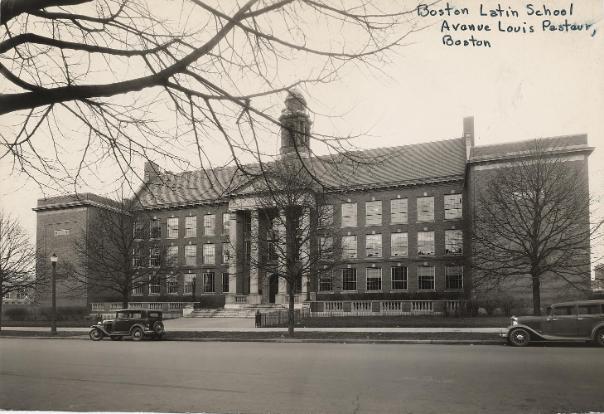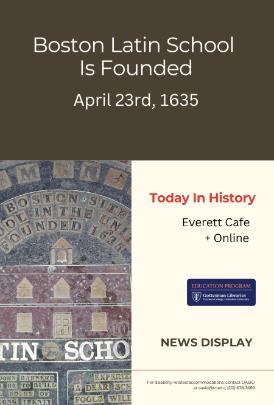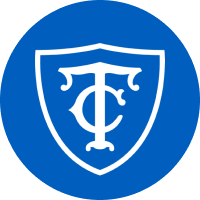Today In History: Boston Latin School Is Founded

Founded on April 23rd, 1635, Boston Latin School is the oldest public school in America, established with funding from the town of Boston. A secondary school for boys, its curriculum centered on the humanities, with courses in Latin and Greek, and it was modeled after the Free Grammar School of Boston, England to prepare students, including future statesmen Samuel Adams, John Hancock, Benjamin Franklin, Robert Paine, and William Hooper, for college. Its early headmasters included Puritans, Latin scholars, and authors of the first primers, or early American textbooks: among them: Philemon Portmont; Daniel Maude; John Woodbridge; Ezekiel Cheever, and Nathaniel Williams.
Although it changed locations throughout history -- from the home of its headmaster, to School Street, to Warren Avenue, to its current location on Avenue Louis Pasteur -- and became co-educational in 1972, Boston Latin School is still fully operational for students enrolled in the 7th through 11th grades. A rigorous exam school, it remains highly competitive and only accepts students who reside in Boston for application to grade 7 and grade 9.
The following articles are drawn from Proquest Historical Newspapers, which informs and inspires classroom teaching and learning.
- First Since 1635: Boys of Boston latin School to Have Reunion Dinner at Hotel Somerset, Dec 15. (1913, Nov 30). Boston Daily Globe (1872-1922)
- de Lue, W. (1922, Mar 10). Tales of the Old Towne: Commenorating the 100th Anniversary of Boston's Incorporation as a City 21 --in Which Boston Engages Its First Schoolmaster. Boston Daily Globe (1872-1922)
- Powers, J. L. (1935, Jan 06). Modern Trends in Education: The Tercentenary of Secondary Schools in America: Boston Latin School Founding in 1635 Marked the Inception of Present Free Training in U. S. New York Herald Tribune (1926-1962)
- Denvir, R. (1935, Apr 19). Reunion in Vienna: Random Chapters of Boston Latin School History--II. Daily Boston Globe (1928-1960)
- Butterfield, F. (1985, Apr 24). Boston Latin Marks 350th Anniversary as Oldest Public School in the U.S. New York Times (1923-)
- Marson, P. (1964, Jan 14). A Roster of Patriots: Founders' Aims Backfire; Puritanism Overthrown. Boston Globe (1960-)
- Boston Latin at 350. (1985, Apr 23). Boston Globe (1960-)
- Kent, D. (1985, Sep 29). Five-Color Commemorative to Honor U.S. Public Education. The Hartford Courant (1923-)
- Shaper, L. (1989, Nov 13). Boston Latin School Is Keeping the Classics Alive. The Christian Science Monitor (1908-)
- Powers, J. (1993, Nov 07). Tough Love at Latin: Inside the Brick Walls at Boston Latin School, Students Find Friends, Diversion, Order, Safety -- and an Exacting Academic Standard. Boston Globe (1960-)

Tips:
- Brooks, Phillips. The Boston Latin School. Place of publication not identified: [publisher not identified], 1893. Closed Stacks Research ; 373.7440 B65p8.
- Jenks, Henry F. (Henry Fitch). Catalogue of the Boston Public Latin School, Established in 1635 with an Historical Sketch. Boston: The Boston Latin School Association, 1886.
- Materials for a Catalogue of the Masters and Scholars Who Belonged to the Public Latin School, Boston, Massachusetts, from 1635 to 1846. Boston: Wm. Crosby and H.P. Nichols, 1847. Closed Stacks Research ; LD7501.B7 L41 1847.
- Scudder, Horace Elisha et al. Memorial of Francis Gardner, LL. D. Late Head-Master of the Boston Latin School. Boston: Printed for the Boston Latin School Association, 1876.
- Two Hundred and Seventy-Fifth Anniversary of the Boston Latin School 1635-1910. Boston: Printed for the association, 1910.
- Warren, William Fairfield. Argument of President Warren on the Admission of Girls to Boston Latin School. Boston? [publisher not identified], 1877.
Images:
- Boston Latin School, Avenue Louis Pasteur, Courtesy of City of Boston Archives.
- Poster Image: Boston Latin Plaque, Courtesy of Wikimedia Commons.
Need to keep current, look to the past, teach a topic? The Everett Cafe features daily postings of news from around the world, and also promotes awareness of historical events from an educational context. Be sure to check additional Cafe News postings on the library blog.

